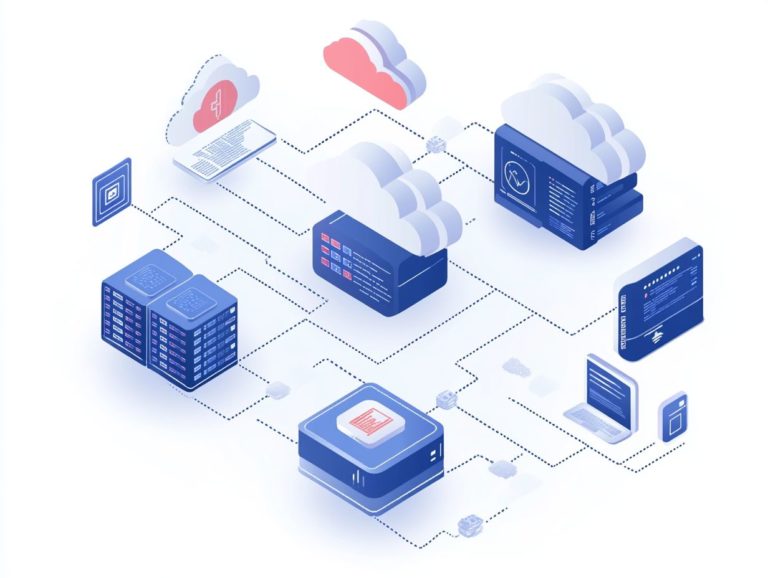10 Best Hybrid Cloud Providers in 2024
In the rapidly evolving landscape of cloud computing, hybrid clouds are emerging as a focal point. They offer the flexibility to harness both on-premises and cloud resources.
As you strive to optimize your IT strategies, understanding the best hybrid cloud providers becomes essential.
Discover the top 10 hybrid cloud providers that will transform your cloud strategy in 2024, featuring industry titans like Amazon Web Services and Microsoft Azure.
You ll learn about hybrid clouds, their key features, the benefits they provide, and the critical factors to consider when choosing a provider.
Dive into this guide and elevate your cloud strategy to new heights.
Contents
- Key Takeaways:
- 1. Amazon Web Services (AWS)
- 2. Microsoft Azure
- 3. Google Cloud Platform (GCP)
- 4. IBM Cloud
- 5. Oracle Cloud
- 6. VMware Cloud on AWS
- 7. Rackspace
- 8. Cisco
- 9. Dell EMC
- 10. Hewlett Packard Enterprise (HPE)
- What Is a Hybrid Cloud and Why Is It Gaining Popularity?
- Frequently Asked Questions
- What is a hybrid cloud and why is it important for businesses in 2024?
- How were the 10 best hybrid cloud providers in 2024 chosen?
- Can I customize the hybrid cloud services offered by these providers to suit my business needs?
- What security measures do these providers have in place to protect my data?
- Can I migrate my existing data and applications to a hybrid cloud environment with these providers?
- Do these providers offer any additional services or support for businesses using their hybrid cloud solutions?
Key Takeaways:

- By 2024, the top 3 hybrid cloud providers will be AWS, Azure, and GCP, thanks to their strong infrastructure and broad service offerings.
- Hybrid clouds combine the benefits of public and private clouds, making them a popular choice for businesses. Key features include scalability, flexibility, and cost-effectiveness.
- When choosing a hybrid cloud provider, consider crucial factors such as security, compatibility, support, and pricing models. Providers may differ in their offerings, so it’s vital to evaluate carefully.
1. Amazon Web Services (AWS)
Amazon Web Services (AWS) stands out as the premier cloud service provider. It delivers a wide range of solutions tailored to meet diverse business needs from data security to disaster recovery.
With its robust infrastructure and innovative services, AWS has secured a commanding share of the global cloud market. You can rent virtualized hardware resources through Infrastructure-as-a-Service (IaaS) while Software-as-a-Service (SaaS) solutions simplify application deployment for end-users.
If you’re looking to develop applications without managing the underlying infrastructure, AWS’s Platform-as-a-Service (PaaS) offerings are designed just for you.
By leveraging AWS, you gain advanced data security measures, including encryption and identity management, ensuring your sensitive information remains protected. Its disaster recovery capabilities offer low-latency backup options, guaranteeing your critical data is always accessible.
AWS plays a crucial role in multi-cloud strategies, enabling seamless integration with other cloud platforms and providing enhanced flexibility and reliability for your enterprise.
2. Microsoft Azure
Microsoft Azure is a leading cloud service provider, particularly noted for its hybrid cloud solutions that effortlessly blend on-premises resources with public cloud capabilities. This integration enhances data security and boosts operational efficiency.
This powerful platform gives you the power to optimize your IT deployments while adhering to stringent security protocols. With offerings like Azure Stack, you can retain control over sensitive data and applications, effectively bridging the divide between local infrastructure and the cloud.
Microsoft’s commitment to regular updates ensures you benefit from the latest security measures, keeping your systems resilient against evolving threats.
Compared to other cloud service providers, Azure’s substantial market share highlights its versatility and reliability, making it a compelling choice for organizations seeking to modernize their IT landscape.
3. Google Cloud Platform (GCP)
Google Cloud Platform (GCP) offers a powerful suite of cloud services, renowned for its capabilities in artificial intelligence and machine learning. This platform equips your business with advanced data security and analytics tools designed to enhance operational performance.
With offerings like BigQuery for data warehousing and AutoML for creating customized machine learning models, you can gain meaningful insights from your data while implementing robust security measures to protect sensitive information.
GCP’s dedication to open-source technologies and seamless integration creates an environment where your teams can innovate quickly and collaborate effectively. Its strong positioning among cloud giants underscores its reliability and scalability, making it an outstanding choice for enterprises eager to modernize operations and leverage data in transformative ways.
Ready to choose your hybrid cloud provider? Let’s dive in!
4. IBM Cloud
IBM Cloud excels in cloud computing infrastructure, specializing in hybrid cloud solutions. It emphasizes data security and enterprise-grade performance to meet diverse industry needs.
By integrating local servers and cloud resources, this platform serves sectors like healthcare, finance, and manufacturing. It empowers you to unlock your data’s potential while adhering to strict regulations.
With strong data security features, you can protect sensitive information from emerging threats. Navigate the complex digital landscape with peace of mind.
Compared to its competitors, IBM Cloud holds a strong market position. Its suite of tools and services appeals to enterprises prioritizing flexibility and reliability.
5. Oracle Cloud
Oracle Cloud is a leading provider known for robust database services and enterprise applications. These tools enhance your data security and operational efficiency.
Utilize features like automatic patching and encryption to reduce data breach risks. Simplify data management and gain real-time analytics for informed decisions.
The suite of applications facilitates integration across business functions. You ll see improved performance metrics and a strong return on investment.
6. VMware Cloud on AWS

VMware Cloud on AWS combines VMware’s virtualization technology with Amazon Web Services for a powerful hybrid cloud infrastructure. This setup ensures smooth application migration and management.
This integration empowers you to use familiar VMware tools while accessing AWS’s extensive services. Streamline your development and operations effortlessly.
With hybrid cloud capabilities, allocate resources for optimal performance and cost efficiency. Enhance business continuity through solutions like disaster recovery.
Easily scale workloads, whether on local servers or in the cloud. Fully harness the flexibility of AWS while maintaining control with VMware’s management suite.
7. Rackspace
Rackspace is a premier cloud service provider known for managed services and hybrid cloud solutions. It helps businesses optimize infrastructure for better performance and cost-efficiency.
With tailored solutions, Rackspace works closely with you to evaluate your unique needs. This ensures you maximize your hybrid cloud environment.
For instance, a healthcare organization improved data management while meeting compliance regulations. Rackspace’s managed services streamlined operations, saving time and increasing agility.
Clients benefit from expert guidance, proactive monitoring, and ongoing support. These elements are crucial for overcoming challenges and maintaining a competitive edge.
8. Cisco
Cisco stands as a global leader in cloud computing, renowned for its robust network infrastructure and security solutions. These solutions empower you to create resilient cloud environments while enhancing data security.
By offering comprehensive networking capabilities, Cisco allows you to seamlessly connect your on-premise and cloud environments, ensuring smooth data flow and operational efficiency.
Their advanced security measures are crucial, safeguarding your sensitive information and protecting against cyber threats issues that are paramount as you transition to the cloud.
As you embrace cloud computing, the integration of reliable network infrastructure and stringent security protocols becomes non-negotiable.
With Cisco’s solutions, you can optimize performance and enjoy peace of mind, knowing your data is secure in a constantly evolving cloud landscape.
9. Dell EMC
Dell EMC stands out as a pivotal force in the cloud computing arena, specializing in advanced data storage solutions and hybrid cloud infrastructure. Their solutions allow you to manage your data effectively while ensuring high availability and security.
By integrating seamlessly into your existing IT landscape, their offerings enable you to leverage the full potential of both on-premises and cloud resources. This flexibility boosts your operational efficiency and provides a solid foundation for scaling and innovation.
With premier security features, you can rest assured that your sensitive data is well-protected against threats. Streamlined data management capabilities enhance your workflows.
To balance accessibility and security, utilize Dell EMC’s technologies as you adopt hybrid cloud strategies, ensuring your data remains accessible yet secure across diverse environments.
10. Hewlett Packard Enterprise (HPE)
Hewlett Packard Enterprise (HPE) is leading the charge in cloud computing, offering cutting-edge hybrid cloud solutions that prioritize data security and seamlessly connect with your existing IT environments. This gives you the power to thrive in an increasingly competitive landscape.
By providing seamless connectivity and robust security features, HPE’s hybrid cloud offerings enable you to optimize your workloads while maintaining compliance and protecting sensitive information. Their unique architecture empowers you to adapt effortlessly to evolving demands.
Advanced analytics and management tools deliver comprehensive insights, equipping your IT teams with the ability to effectively monitor and control their environments.
HPE distinguishes itself in the crowded marketplace by focusing on an integrated approach that not only bolsters data security but also nurtures a collaborative ecosystem. This innovative approach empowers you to push boundaries and drive growth!
What Is a Hybrid Cloud and Why Is It Gaining Popularity?
A hybrid cloud seamlessly blends public and private cloud environments, allowing you to harness the advantages of both while ensuring robust data security and compliance. A public cloud is a service offered by third-party providers where resources are shared among multiple users. A private cloud is a dedicated environment just for your organization. This is a key reason why it s gaining traction across various industries that prioritize flexibility and scalability.
This model optimizes resources and manages costs by securely storing sensitive data in a private cloud while using the public cloud for less critical applications. The scalability offered by hybrid clouds means you can effortlessly adjust your computing resources to meet fluctuating demands.
As you navigate the increasing data security requirements and compliance mandates, this architecture provides a balanced strategy that mitigates risks. By integrating various components tailored to the unique needs of your operations, you can cultivate an efficient and resilient IT infrastructure that not only supports your current objectives but also paves the way for future growth.
What Are the Key Features of a Hybrid Cloud?

Key features of a hybrid cloud include remarkable flexibility and scalability. These allow you to dynamically allocate resources based on evolving needs and workload demands.
Enhanced data security is also vital. This setup gives you the power to respond swiftly to market changes while optimizing costs.
For instance, a financial institution might use hybrid cloud capabilities to process large volumes of transactions in real-time. They can use public cloud resources during peak times while safeguarding customer information in a private cloud.
Similarly, a media company can adopt a hybrid setup to deliver streaming content effectively. This approach allows them to adjust bandwidth based on audience size and preferences, while maintaining strong security protocols.
What Are the Benefits of Using a Hybrid Cloud?
Adopting a hybrid cloud can transform your business! You gain cost efficiency, enhanced data security, and the flexibility to scale resources as your business grows.
You can use your on-premises infrastructure for sensitive data while using public cloud services for less critical operations. This strategy effectively optimizes costs.
Companies like GE have embraced hybrid solutions to balance workloads, leading to substantial savings in hardware and maintenance.
Implement robust security measures, including advanced encryption and multi-factor authentication. Organizations like IBM have also adopted hybrid clouds, elevating their security while benefiting from scalable resources that adapt to shifting demands.
What Are the Factors to Consider When Choosing a Hybrid Cloud Provider?
When selecting a hybrid cloud provider, weigh factors like data security, compliance with regulations, reputation, and consider using the top 10 cloud cost management tools for 2024 to help evaluate pricing models.
Scrutinize the security features available, as strong data protection is essential for safeguarding sensitive information. Ensure compliance capabilities align with industry standards to avoid legal pitfalls.
Don t overlook pricing structures; they significantly impact your budgeting process. Transparent pricing prevents unexpected costs from arising.
Thoroughly evaluating these elements will help you choose a provider that meets your immediate needs while supporting future growth.
How Do These Providers Compare in Terms of Pricing and Services Offered?
When comparing hybrid cloud providers, dive into their pricing structures and services offered. This analysis is key for your business.
Different providers have various pricing models some offer pay-as-you-go options, while others have flat-rate subscriptions. Service offerings can vary widely too.
Some providers excel in advanced data analytics and machine learning, while others focus on robust security features or seamless migration processes. For a comprehensive look at the leading options, check out the cloud provider ratings for 2024. Don’t overlook market share; larger providers often offer greater reliability and support.
Understanding these nuances empowers you to make informed choices that align with your operational needs and strategic goals. This approach enhances performance and cost efficiency, ensuring you get the most value from your investment.
What Are the Future Predictions for Hybrid Cloud Providers?
Get ready for a booming future with hybrid cloud providers! You can expect significant growth driven by market trends favoring flexible and scalable cloud solutions for enterprises in 2024.
Data security and advanced cloud computing technologies are becoming crucial for businesses today. As a result, adopting hybrid cloud models is becoming the norm.
This model allows seamless integration between your on-premises infrastructure and cloud services. It helps you optimize resources and manage workloads effectively.
Furthermore, it opens doors to innovative technologies like AI and machine learning.
With increasing concerns about compliance and data sovereignty meaning that data is subject to the laws of where it is collected providers will need to adapt their offerings. This evolution will reshape the competitive landscape.
In this fast-changing environment, service providers who anticipate shifts will thrive and grow their market presence.
Frequently Asked Questions
What is a hybrid cloud and why is it important for businesses in 2024?

A hybrid cloud is a combination of public and private cloud environments, allowing companies to leverage the benefits of both. It is important for businesses in 2024 as it offers flexibility, scalability, and cost-effectiveness, enabling them to meet changing customer demands and stay competitive. Exploring the best cloud migration services in 2024 can further enhance these advantages.
How were the 10 best hybrid cloud providers in 2024 chosen?
The 10 best hybrid cloud providers in 2024 were selected based on their offerings, market share, customer satisfaction, and future growth potential, including the top 10 PaaS providers. Extensive research and analysis created a comprehensive list of the most reliable and innovative providers in the industry.
Can I customize the hybrid cloud services offered by these providers to suit my business needs?
Yes, most of the 10 best hybrid cloud providers in 2024 offer customizable solutions tailored to your specific requirements. To stay informed about the latest offerings, check out the top hybrid cloud trends to watch in 2024. This allows you to pay only for the services you need and scale them as necessary.
What security measures do these providers have in place to protect my data?
Data security is a top priority for these providers, with various measures in place to protect your information. This includes encryption, firewalls, multi-factor authentication, and regular security audits. They also have disaster recovery plans to keep your data safe during a breach or disaster.
Can I migrate my existing data and applications to a hybrid cloud environment with these providers?
Yes, most of these providers offer migration services to help businesses seamlessly transfer their data and applications to a hybrid cloud environment. Their experts assist with the process to minimize potential disruptions to your operations.
Do these providers offer any additional services or support for businesses using their hybrid cloud solutions?
Yes, these providers offer various additional services and support, such as training, consulting, and monitoring, to help businesses maximize the benefits of their hybrid cloud solutions. For enhanced security, exploring the top 10 cloud security tools for 2024 can also be beneficial. They also have dedicated customer support teams ready to assist with any technical issues or inquiries.






